Suffolk is still haunted by the war, specifically by the airfields that made George Orwell who lived here call England Airstrip One in 1984, a tribute to the fact that where I live you can’t drive more than ten miles in any direction except the sea without coming across yet another mile long strip of concrete crossed by two more to make a giant A. Or where they’re gone, a trading estate and a small memorial, usually with two flag poles, a plaque and a wreath. The numbers are horrifying. 82 dead at the little fighter airfield down the road in Leiston, given that these were single seater aircraft. Two hundred and forty something at a plaque I read in Thetford yesterday, a tribute to a Czechoslovakian squadron there, the kind of people Nigel Forage wouldn’t let polish his Lobbs. If he actually has any.
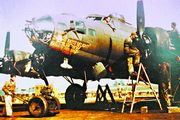 I read this poem when I got home from work, the ball-turret gunner. It’s very, very short. The ‘analysis’ of it is why people don’t like poetry, or English, or school.
I read this poem when I got home from work, the ball-turret gunner. It’s very, very short. The ‘analysis’ of it is why people don’t like poetry, or English, or school.
POEM EXPLICATED : The ball turret gunner as allegory of the modern state
In 1945, Randall Jarrell published a short poem about the death of a ball turret gunner in the Second World War.[1] —
THE DEATH OF THE BALL TURRET GUNNER
By Randall Jarrell (1914-1965)
From my mother’s sleep I fell into the State,
And I hunched in its belly till my wet fur froze.
Six miles from earth, loosed from its dream of life,
I woke to black flak and the nightmare fighters.
When I died they washed me out of the turret with a hose.
Randall Jarrell was a genius. But to understand the poem you have to know several things.
Thing One: There was an enormous air war over Germany from 1943 to 1945 after General Eisenhower decided not just to take the fight to the enemy, but simply to destroy Germany. Not nullify its army or make it militarily incapable, but along with Bomber Harris, decide to destroy it. I met an American fighter pilot. I asked him how before sat nav and onboard radar and identification transponders, when outside of radio from base the only way to link up with the bombers to protect them was to see them and fly close enough to be handy but not so close the gunners hosed you down with fifty calibre on general principles, which apparently happened a lot more than once when mere mortals standing five miles high got flak happy. He told me that when you were supposed to escort 1,000 bomber raids all you had to do was follow the con-trails in the sky, the water vapour in the exhausts cooling and making a road in the sky. You don’t assemble that many of anything if you don’t want something gone for good.
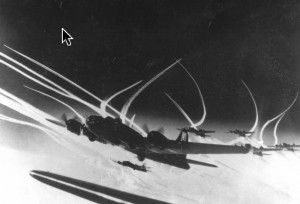
Thing Two:
Hanging underneath B17s and B24s was a ball-turret. It was a plexiglass dome that a small man sat in along with two machine guns spitting out one minute’s worth of bullets half an inch across. He couldn’t see anyone else for up to eight hours, as he hung suspended in his seat, separate from the land only by a thin sheet of plastic and 30,000 feet of air. You see the lump underneath the airplane, about half way along it. Ball-turret.
Thing Three: German anti-aircraft shells made black smoke when they exploded.
Thing Four: In the bomber war the USAAF flew by day. The RAF flew at night.
If Mark Jensen, whoever he is, had known all of these things instead of just some of them maybe his review wouldn’t have been the sort of tendentious bollocks that makes people vow never to read another book after they’ve left school.
FALLING INTO THE STATE AND AWAKING TO DIE
By Mark Jensen
United for Peace of Pierce County
July 4, 2012
The speaker in this 1945 poem is a ball turret gunner who has died. We know almost nothing about him. The gunner is speaking to us, mostly in a flat tone, but occasionally with terse lyricism, about his death. Since he is dead, the speech is disembodied. It is, evidently, the gunner’s voice as imagined by the poet.
Properly speaking, there is no setting of time or place for his speech, as is also the case for his death, in a sense. The casual reader probably imagines that the gunner has died at night. While this is likely enough, it need not be so, since the blackness of the “black flak” may refer to the doom it brings the gunner rather than the time of day, and the “nightmare fighters” may be nightmarish because they are what he most feared. The gunner’s death occurred “six miles from earth,” so far about the planet’s surface that the life below seems merely a “dream” — so abstracted (“into the State”) from ordinary life that his death, too, seems a dream, a “nightmare.” But of course it is not a dream, as the brutal final line of the poem blandly conveys.
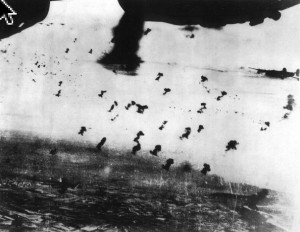
I can’t even bear to go on. Already the total ignorance (no, the black is about the time of day) is balanced only by the high school conviction that no other interpretation is possible. And utter crap. The black flak, or anti-aircraft shells exploding, was black because that was the colour it was. Nothing to do with the time of day, which was in any case day rather thannight. Utter, utter bollocks, as English teachers should be encouraged to say faced with crap like this.
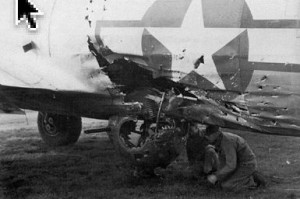
As for “the nightmare fighters may be nightmarish because they are what he most feared,” THE BALL TURRET GUNNER WAS HANGING OUTSIDE THE SODDING AIRCRAFT. HE WAS USUALLY, ALONG WITH THE TAIL GUNNER, THE FIRST ONE TO BE SHOT AT. And breathe.
The poem’s first words remind the reader that the gunner had a mother, was ofwoman born, and was taken from her (suggesting his extreme youth) and thrust so naturally into the service of “the State” that it seemed he “fell into” his military role. But in fact there was nothing natural about it: crammed into his “ball turret,” the gunner is “hunched” and reduced to animal-like discomfort (“my wet fur froze”). Calling attention to the outrageousness of something that appears so natural, or rather so socially obligatory, is the central purpose of the poem.
And another central purpose of the poem is a reminder that when you fly for eight hours and are terrified for several of them and you are five miles up in the sky in winter without any heating and no onboard WC, there are inevitable consequences which the reviewer might have thought about if he wasn’t writing bollocks like ‘of woman born.’
And what is this outrageous thing? That war snatches boys from their mothers, stuffs them into the belly of the state, and consumes their lives — then “washes” them “out” to make room for more. Consciousness of this seems only latent in the laconic gunner, who has a hard-bitten economy of speech. No romantic he. This tone is achieved by simple vocabulary and dispassionate declarative sentences uttered from beyond the grave — the grave his mutilated remains, “washed . . . out of the turret with a hose” (a steam hose, Jarrell said in a commentary on the poem), probably never had.
Crap, crap and more crap. Only latent, this consciousness? Nobody onboard those aircraft wasn’t conscious of the fact that statistically, they weren’t coming home. How does anyone write stuff like “No romantic he”?
The action of this compact poem is very simple: from “sleep,” and not even his own sleep, the gunner “woke” — and “died.” The brevity of it all almost suggests a revelation, a revelation of a bleak, “black,” “nightmare,” sort. Instead of awaking in a dark wood, like Dante, to be guided by Virgil to a beatific vision, the gunner awakes to death and recounts his own demise as if it were some nihilistic vision.
I don’t really know what else being shredded by 20mm cannon and your squashy remains needing a hose to get them off the airplane could actually be, other than a nihilistic vision, the sort of thing people buried in a bucket might have. My father was in the RAF in the war. He was ground crew, not the pilot he pretended to be, but he once let slip that cleaning out shot-up aircraft was punishment duty.
The events the gunner describes do have a dreamlike quality: “falling” from his “mother’s sleep . . . into the State,” “hunch[ing] in [the State’s] belly” until his “wet fur froze . . . [s]ix miles from earth,” he is “loosed from [earth’s] dream of life” before being loosed from life itself by the dire, fell forces to which “the State” has exposed him. But in the final line the dreamlike quality disappears: “When I died they washed me out of the turret with a hose.”
From another’s sleep, awakening to death; then disposal of the remains. Who has betrayed whom? Who is to blame? The reader is invited to wonder whether the mother is responsible, or the State (with its capital S), or the “nightmare fighters” with their “black flak” (rhymes withack-ack), or even the gunner. Are we all to blame? By phrasing the initial line in such an artfully oblique manner, Jarrell invites the reader to turn his poem about like a rough-cut jewel, seeking the proper perspective. For surely there must be a proper perspective. But it is in the nature of war to instill doubt about this — a doubt that is appallingly expressed in the final, banal image of “a hose” in action.
The gunner — merely a boy — is “loosed from [earth’s] dream of life,” then “washed . . . out of the turret with a hose.”
Look more closely at the first line. “From my mother’s sleep I fell into the State.” Falling here is metaphorical — it implies a change from an exalted condition to a degraded condition, from the condition of precious beloved offspring to that of instrumentalized military functionary. But the fall is not from the mother’s love, but from her “sleep.” “From” (the poem’s first word) her sleep. Note that from can mean many things. It can refer to a starting point — and is a “mother’s sleep” not the starting point of us all? But from can also refer to a separation or an exclusion — by going to war, the gunner had to leave his home behind. Finally, from can also refer to cause : the gunner “fell into the State”because his mother was sleeping — was perhaps unaware, or not cognizant, of what her son was doing — had she known, had she been awake, perhaps his doom could somehow have been avoided, or evaded. Perhaps he would not have had to die as he did, to die not as some heroically falling warrior, but to die as a mangled, shredded, torn, disfigured deposit of matter smeared on the walls of a ball turret that has to be “washed . . . out” (to be used again).
In this poem, “the State” has a “belly.” But unlike in his “mother’s” belly, in “its belly” he was not warmed and nurtured, rather he “froze” and “died.” Perhaps the “dream of life” that turned into a “nightmare” is not the earth’s after all, but “the State”‘s. For “the State” is personified in the poem as a monstrous mother who consumes her young, a Gorgon. Enlistment is entering into a voracious vagina dentata that kills. This is a Gorgon that wears no mask; rather it is her own offspring that she transforms into objects of horror — all the more horrible in this poem for the ironic litotes of the final line, for of course it is not “me” that is “washed . . . out of the turret with a hose” but a putrescible semiliquid agglomeration of organic matter fit only to be “washed . . . out” with a (steam) hose.
And yet more bollocks. And yet more repetition. Five miles high if you aren’t wearing an oxygen mask you will be dead in seconds. So you can be pretty sure that the writer, knowing this, whatever else he had in mind, certainly didn’t have anything unmasked in there as well.
The entire poem becomes a symbol, perhaps, of the potential relation of the individual to the modern state.
I detest the word ‘perhaps.’ Is it or isn’t it? At best, it’s just a filler word. At worst, as it is here, it’s ‘let’s crap on for another five minutes and if anyone says ‘that’s bollocks actually’ you can still say ah yes but I said perhaps. So second year.
After all, this is a poem written in 1945, the year of Hiroshima and Nagasaki. Is it all of human history that Randall Jarrell has, perhaps unwittingly, allegorized in “The Death of the Ball Turret Gunner”? The poem was written in a dark disordered time. And the rhythm of the poem is disordered, too. Only the last line, which reports how his remains are cleaned up, is ordered, anapestically: (???|????|???|????). The other lines of the poem are in a state of metrical disorder, one plausible reading of which is this:
???|??|??|?????
???|???|????|??
??|??|?|?????
??|???|???|???
In the third and fourth lines, when the aircraft is under attack, the disorder is most extreme. The rhyme scheme, too, is disordered and defective: abcdb, with no rhyme in the third and fourth lines.
Jarrell’s poem is a masterpiece. So well-received was it that he feared that it would be his only literary legacy. But could there be a finer one?
All this review is in the main is repetition, but there is a huge amount of pomposity seasoned with nonsense and gibberish as well. Why does it annoy me so much? Perhaps because I see these memorials most days, silent at the side of East Anglian roads.
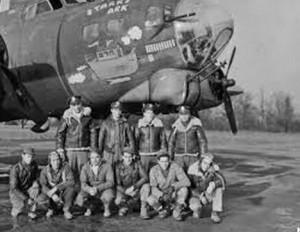
Perhaps because of the numbers on the plaques, the Aarons and Fletchers and Ottos, the smart young men in the recruiting films who never came home again. Perhaps because anyone who can dick about, inserting vagina dentata into this straightforward poem has issues not just with vaginas but seems to feel a war is as welcoming, otherwise the reference makes no sense at all; but maybe, being American and safely in no danger of being bombed except by disgruntled homegrown pretend fascists, that’s exactly how he sees wars. And who the ***K says explicated, anyway?
Within a month someone in the UK government is going to say in public, out loud, that it would be a good idea to send soldiers to fight in the Ukraine. I think this is why this stupid analysis of this short poem irritates me so much. It misses the point entirely, so wrapped in its own self-importance.



